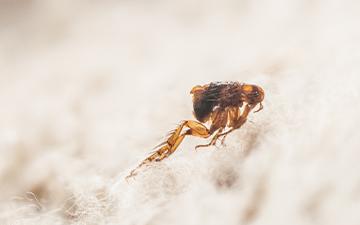
Find out if they’ve been flea treated before
The first thing to do is to find out if the new cat or dog has already been flea-treated by the breeder, animal rescue centre or previous owners, along with what they’ve been treated with and when. The answer to that determines what to do next.
If they’ve already been treated…
If the cat or dog you’ve found fleas on has recently been flea-treated, it’s important not to treat them again until the next treatment interval comes around. For example, some flea treatments can only be applied once a month, others can only be used once every three months.
Sadly for us pet parents, there aren’t any flea treatments that stop fleas from the environment from jumping onto pets. If you’ve seen fleas on a treated dog or cat, it’s probably a new flea that’s just jumped on them from the environment and the flea treatment will soon sort it out.
The key thing to remember is that the treatment they’ve recently had should be working against these newly arriving fleas. Find out why fleas may still be alive after treatment.
If they’ve not been treated…
If a flea treatment hasn’t been given at your pet’s previous place, now’s the time to treat them. We’ve got some specific advice on how to get rid of fleas. And it’s good to know that FRONTLINE® spot-on treatments are suitable for puppies aged 8 weeks and over who weigh at least 2 kg and kittens aged 8 weeks and over weighing at least 1 kg.

Was there previously a pet in your home?
It’s a bit yucky to think about, but homes that haven’t had a pet in them for a while can have a flea infestation that’s laid dormant there for months until a new pet arrives and triggers these dormant fleas to hatch. In this case, it’s not the new pet that brought fleas home – instead, the new pet has simply brought these fleas out of hiding.
How does this happen? Well, flea eggs that have fallen off a previous pet (yours or someone else’s, if you’re in a new home) can develop into flea larvae that burrow into carpets, furnishings and nooks and crannies. These larvae then develop into flea pupae, which each contain a developing flea. The presence of a new cat or dog would encourage the new fleas to hatch out and start biting – and that could be why you’ve found fleas on your cat or dog.
Fortunately, household flea sprays such as FRONTLINE HOMEGARD® kill adult fleas, eggs and larvae in our homes. A word of warning – flea pupae are super-strong and impervious to any chemicals, so if they’re already there, new fleas will still hatch out of them. Luckily, the household spray and flea treatment on the pet will kill these new fleas off quickly.
Worried about a dormant home flea infestation? You can use a household flea spray, just in case – and remember to treat pets with a suitable product too.

What to do to help pets stay safe from fleas in future
It’s always best to flea treat your pet according to their lifestyle. For example, cats who go outdoors are at higher risk of picking up fleas, ticks and worms than indoor only cats. And dogs who go to areas where wildlife (such as foxes and hedgehogs) are found will be at higher risk than those who don’t. Ask your vet what they’d recommend for your pet’s lifestyle.
Now you know what to do if you’ve found fleas on a new cat or dog, you can deal with what’s happening and carry on basking in all the love and laughter a new pet brings.
MORE FROM FLEAS


Spotted fleas in your home? The pet experts at FRONTLINE® can help you spot the signs of an infestation and what you can do about it.


Wherever your pet goes, they are at risk of picking up hitchhiker fleas from eggs dropped by untreated pets and wildlife.


When you welcome a new pet into your home, you could also be welcoming fleas they carry.


We talk you through the three key reasons you're still seeing active fleas on your dog or cat - even after flea and tick treatment - and what you need to do now.


Prevention is better than cure - learn how to prevents and protect your pets from fleas all year round, with expert advice.


Spotted fleas in your home but don't have a cat or dog? FRONTLINE's pet experts outline why and how to get rid of these critters for good.

Join the #PetParentClub
We’ve got an amazing community of dedicated pet parents on our social channels. You’ll find pet care tips and cute pics, plus advice from our pet experts. We can’t wait to welcome you to the club!




